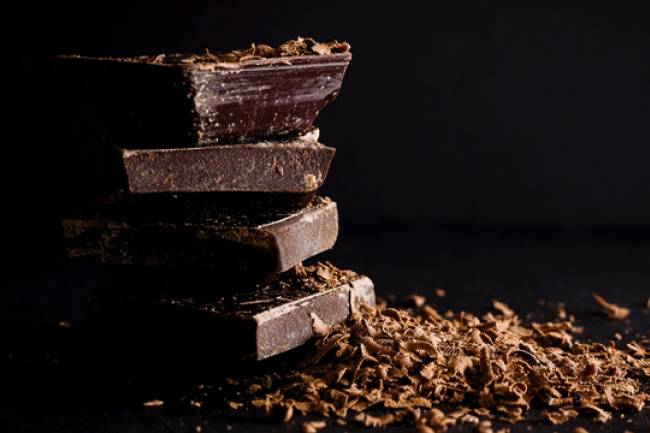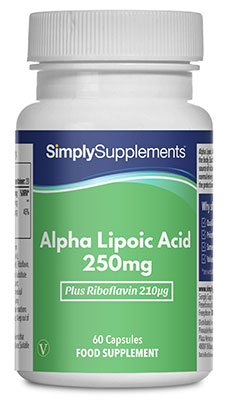Can Alpha Lipoic Acid Help Me Lose Weight?

Losing weight can feel like an uphill struggle sometimes, with changes to our body coming slowly and gradually. Supplements can assist the body with controlling our weight, with little in the way of side effects; alpha lipoic acid can be another tool in your arsenal.
We’re here to explain what this complex-sounding supplement affects in your body, and how exactly it can help with your weight-loss regime. Let’s take a look at the science behind what this acid actually does to the body:
What is Alpha Lipoic Acid?
Alpha lipoic acid (ALA) is a fatty acid which is often referred to as the ‘universal antioxidant'. In supplement form, it has long been taken to improve glucose sensitivity and treat diabetes, but more recently attention has moved to its potential for weight loss and muscle gains.
This powerful antioxidant is both water and fat-soluble, which means that it works inside and outside cells to destroy harmful free radicals. ALA also recycles and enhances other antioxidants in the body, including vitamins C and E, glutathione and coenzyme q10, which further strengthens the body's defences.
Inside cells, ALA works in the mitochondria (the energy-producing part of our cells) and is an important cofactor in the conversion of glucose to energy. However, glucose first needs to be attached to insulin before it can be carried into cells. Because ALA mimics the actions of insulin, it helps to improve glucose metabolism and insulin sensitivity, which means that more glucose is transported into cells and less glucose is stored as fat.
Alpha Lipoic Acid for Weight Loss
ALA improves the conversion of carbohydrates to energy, which means that fewer carbs are stored as fat cells. Several large-scale trials have shown that ALA supplements have the potential to boost weight loss efforts when taken in combination with a calorie controlled diet:
- A study from early 2015, published in the Obesity journal, involved 77 overweight women who were randomly assigned to one of four groups: those in group one were given a placebo, group two were given 1300mg of EPA, group three were given 300mg of alpha lipoic acid, while group four were given a combination of EPA and ALA. All women were required to follow a reduced calorie diet throughout the 10-week trial. Findings showed that 300mg of ALA per day combined with an energy restricted diet was most effective at reducing weight and fat mass, with an average of 7kgs lost.
- In 2011, the American Journal of Medicine published a trial involving 360 overweight participants who were assigned to one of three groups; those in group one took 1200mg of ALA per day, those in group two took 1800mg, while those in group three were given a placebo. Supplements were taken 30 minutes before meals and all participants were asked to cut their calorie intake by 600 per day for the duration of the five-month trial. Researchers found that both ALA groups experienced weight loss, with the 1800mg group being significantly greater.
- A 2010 study published in Current Pharmaceutical Design involved 1127 overweight participants who took 800mg of ALA daily over four months. At the end of the trial, participants lost 8% to 9% of their total body weight, which was an average of 15lbs. However, this study had no control (placebo) group and so the quality of the findings has been understandably questioned.
- A separate study from 1999 involved 74 participants with type 2 diabetes, who were split into four groups; group one took 600mg of ALA once per day, group two took 600mg of ALA twice per day, group three took 600mg three times per day, while group four took a placebo. Findings showed that all groups given ALA experienced significantly greater insulin sensitivity compared to the placebo group. Balancing insulin levels is known to have direct benefits for weight loss.
Researchers generally agree that ALA works by helping to store carbohydrates from food as glycogen in muscle cells rather than turning it into fat. For this reason, it can be particularly useful for people who consume high-calorie diets rich in carbohydrates.
ALA has also become popular with bodybuilders in recent years to help build muscle while losing fat. The increase in glucose uptake means that more glucose is transported into muscle cells rather than fat cells, which may increase muscle size and reduce fat accumulation. Bodybuilders often take ALA in very high doses of 1500mg to 3000mg per day to support bulking and defining their physique.
How Much Do I Need?
ALA is produced by the body and absorbed from the foods we eat. A recommended daily allowance (RDA) has not been established, but around 600mg per day is widely accepted to be safe. High doses of 1200mg to 3000mg are often used by bodybuilders or to treat diabetic neuropathy. Such high quantities should be broken down and taken over the course of the day and, ideally, be taken with food to improve absorption.
The best food sources of ALA are red meat, liver and kidneys, which are also high in saturated fat and should be eaten in moderation. Good vegetable options include spinach and potatoes (with their skin). Although, compared to supplements, food sources contain minimal amounts of ALA and haven't been shown to have the same benefits for weight loss or glucose sensitivity. So for some people taking an ALA supplement can be a smart move.
As with all supplements, they are most effective when taken with a healthy diet and regular exercise regime. Studies show that ALA supplements accelerate weight loss when combined with a healthy lifestyle, but are not as effective on their own.
Side effects to ALA are extremely rare, but at high doses may result in skin rashes, nausea or dizziness. If you are taking any medications to treat diabetes you should consult your GP to help monitor your blood glucose levels closely.
Conclusion
As you can see, there’s evidence to show that ALA could be of help during a weight-loss diet. Not only that, but due to its powerful antioxidant effects it could also help fight the effects of skin ageing – a health and beauty double-whammy.
Of course, it’s important to follow the instructions when taking these supplements. If you’re concerned about ALA interfering with other medication or conditions, consult your doctor before taking it. This is especially important for those with diabetes, as ALA has an effect on blood sugar levels in the body.

 Nicole
Nicole 

























